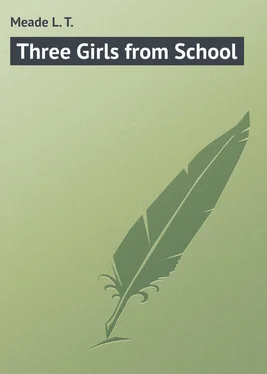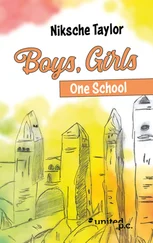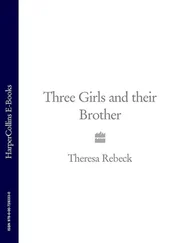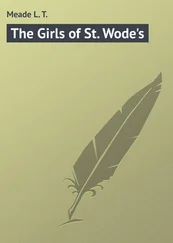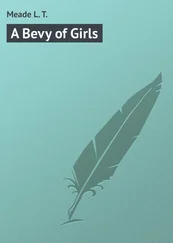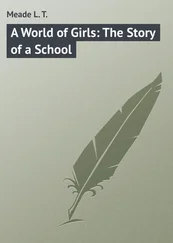L. Meade - Three Girls from School
Здесь есть возможность читать онлайн «L. Meade - Three Girls from School» — ознакомительный отрывок электронной книги совершенно бесплатно, а после прочтения отрывка купить полную версию. В некоторых случаях можно слушать аудио, скачать через торрент в формате fb2 и присутствует краткое содержание. Жанр: foreign_prose, foreign_children, на английском языке. Описание произведения, (предисловие) а так же отзывы посетителей доступны на портале библиотеки ЛибКат.
- Название:Three Girls from School
- Автор:
- Жанр:
- Год:неизвестен
- ISBN:нет данных
- Рейтинг книги:5 / 5. Голосов: 1
-
Избранное:Добавить в избранное
- Отзывы:
-
Ваша оценка:
- 100
- 1
- 2
- 3
- 4
- 5
Three Girls from School: краткое содержание, описание и аннотация
Предлагаем к чтению аннотацию, описание, краткое содержание или предисловие (зависит от того, что написал сам автор книги «Three Girls from School»). Если вы не нашли необходимую информацию о книге — напишите в комментариях, мы постараемся отыскать её.
Three Girls from School — читать онлайн ознакомительный отрывок
Ниже представлен текст книги, разбитый по страницам. Система сохранения места последней прочитанной страницы, позволяет с удобством читать онлайн бесплатно книгу «Three Girls from School», без необходимости каждый раз заново искать на чём Вы остановились. Поставьте закладку, и сможете в любой момент перейти на страницу, на которой закончили чтение.
Интервал:
Закладка:
“What is the matter with Mabel?” she said.
“How queer she looks!”
“I had best go to her, I suppose,” said Annie. “She is such an old silly that unless I keep by her side she is sure to do some thing wrong.”
“Here you are, Annie,” cried Constance. “Now you will be on our side. You have assured us that Mabel is not the dunce of the school, but the genius.”
“So she is,” said Annie indignantly. “Who dares to deny it?”
“None of us,” said Constance; “only we want proof.”
“What do you mean?” said Annie, still quite calm in appearance, but feeling a little uncomfortable nevertheless.
“We want proof,” repeated Constance.
“Yes,” said Agnes – “proof.”
“Proof, proof!” echoed several other voices. “Mabel writes verses – very clever verses. We want to see them.”
“So you shall,” said Annie at once.
“Oh Annie, I won’t show them,” said poor Mabel.
“Nonsense, May! that is absurd. Girls, you can see them to-morrow afternoon. To-morrow is our half-holiday; Mabel will read her verses aloud herself to you at four o’clock to-morrow on this identical spot. She has no time now, for the gong has just sounded for tea.”
Mabel turned a flushed, surprised face towards Annie. Priscilla stood perfectly still in unbounded astonishment. The girls were not quite satisfied; still, there was nothing to complain of. They must go to tea now. Immediately after tea school-work would recommence; there would not be a moment of time to read the verses before the following day. Annie, leaving Mabel to her fate, marched into the house, her hand on Constance Smedley’s arm.
“I am glad I came out,” she said. “Poor May is quite abnormally sensitive on the subject of her verses.”
“Nonsense!” said Constance. “If she writes verses she won’t mind our seeing them.”
“She ought not to mind; and if she were an ordinary girl she would not,” said Annie. “But, you see, she is not ordinary. There is many a girl with a genius who, as regards other matters, is even a little silly. The fact is, Mabel is frightened of her own talent.”
“Well, we are glad you came up, for we are quite determined to get a specimen of our genius’s work,” said Constance.
“You shall know all about it; she will read them to you herself. Ta-ta for the present.”
Annie marched to her own place at the tea-table, and nothing more was said. But she was not comfortable. She had got herself and her unfortunate friend into a hornet’s nest. Verses of some sort must be produced; but how? Annie could not write the most abject doggerel. Clever enough with regard to her prose, she was hopeless as a rhymster. Perhaps Priscie could do it. Annie looked wildly at Priscie, but as she looked even this hope faded away. She had had a conversation with that young lady on that very afternoon, and Priscie, although she was to have her extra year at school – for everything was quite arranged now – did not seem to be happy about it. She had even gone to the length of telling Annie that she would prefer learning how to manage a farm-house or becoming a country dressmaker to staying on at Lyttelton School under the present conditions. Annie had assured her that if she failed them now, the mischief she would do would be so incalculable that it would practically never end, and Priscilla had been quieted for the time being. But Priscilla’s conscience must not be further tampered with; Annie was resolved on that point. What, oh! what was she to do?
During the rest of that evening, while apparently busy over her studies, the mind of Annie Brooke was in a whirl. In what sort of way was she to fulfil her promise made to all those odious girls that Mabel would read her verses aloud? She saw that the girls were already slightly suspicious. She knew it was all-important for Mabel’s success when she won the literary prize that the girls’ minds should be already prepared with regard to her genius. If they were really satisfied that she wrote even moderately good verse, they would accept without comment the fact that she had won the prize over Priscilla’s head. But how – oh! how – in what sort of fashion were these verses to be produced?
Annie was in the mood when she would have stopped short at very little. Could she have safely pilfered the verses of anybody else she would have done so; but there was no great store of poetry at the school. The few books out of which the girls learned their different pieces for recitation were too well-known to be tampered with, and yet Annie must do something. Her head ached with the enormity of the task which she had so unwittingly undertaken. Why, oh! why had she started that awful idea of Mabel’s poetical genius in the school? Far better would it have been even to have the girls’ suspicions slightly aroused by the excellence of her prize essay. Poor Annie had not only to think of this and to solve the riddle set her, but she had to appear before the eyes of her schoolfellows as utterly calm and cool. She was at her wits’-end, and certainly matters were not improved when Mabel that night tapped at her wall – the signal that the girls had arranged between them when it was necessary for one to speak to the other.
It was about eleven at night when Annie, feeling miserable beyond words, crept into Mabel’s room. Mabel was sitting up in bed with all her fine hair hanging about her shoulders.
“I have not had a minute to speak to you before,” said Mabel. “You know perfectly well, Annie, that I never wrote a line of poetry in my life. I can’t abide the stuff; I can’t even read it, far lees write it. And now what is to be done? You are going to produce a specimen of my verse which I am to read aloud before all those odious girls to-morrow!”
“Oh, I’ll manage it,” said Annie; “only don’t keep me now, May. I had to start that little rumour in order to make it all safe for you on prize day. You don’t suppose, darling did May, that I have brought you as far as this with such wonderful success in order to desert you now? You leave it to me, May Flower. I’ll manage it for you somehow.”
Mabel lay back on her pillow. “I did get an awful fright,” she said. “I can’t tell you how terrible it was when they all clustered round me, and Agnes remarked one thing about me, and Constance another. Agnes said I was a satirist. What on earth is a satirist, Annie?”
“Oh, not you, darling, at any rate,” said Annie, kissing her friend. “Poor May! that is the very last thing you could ever be.”
“I know you think me very stupid,” said Mabel in an offended tone. “It is too awful to give a girl the imputation of a genius, when you know all the time that she is an absolute fool.”
“A very pretty one, at any rate,” said Annie, kissing her friend again. “You’re not offended, silly May, because I said you were not a satirist? Why, a satirist is an awful creature, dreaded by everybody. A satirist is a person who makes fun of her best friends. Now, you would never make fun of your own Annie, would you?”
“No, indeed! I am glad I am not a satirist,” said May. “What a horror those girls must think me!”
“Go to by-by now, May, and leave me to settle things for you,” said Annie; and she crept back to her own bed.
Chapter Eight
A Touch of the Sun
Towards morning a thought came to Annie. She could not quite tell when it first darted through her brain. Perhaps it came in a dream. She was never quite certain, but it certainly caused her to jump, and it made her heart beat tumultuously.
“I wonder,” she said aloud; and then she added, “The very thing!” Then she said once more, “I will do it, or my name is not Annie Brooke.”
That morning the mistress and the girls missed the pleasant face of Annie Brooke from the breakfast-table. Mabel Lushington, as her greatest friend, was begged to go to her room to see if anything was the matter. She tapped at Annie’s door. A very faint reply came, and Mabel entered in much consternation. She found her friend lying in bed, a handkerchief wrung out of eau-de-Cologne and water on her brow, her hair dishevelled, her face pale.
Читать дальшеИнтервал:
Закладка:
Похожие книги на «Three Girls from School»
Представляем Вашему вниманию похожие книги на «Three Girls from School» списком для выбора. Мы отобрали схожую по названию и смыслу литературу в надежде предоставить читателям больше вариантов отыскать новые, интересные, ещё непрочитанные произведения.
Обсуждение, отзывы о книге «Three Girls from School» и просто собственные мнения читателей. Оставьте ваши комментарии, напишите, что Вы думаете о произведении, его смысле или главных героях. Укажите что конкретно понравилось, а что нет, и почему Вы так считаете.
